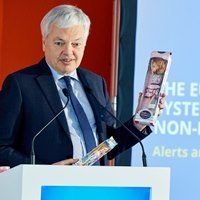(BRUSSELS) – Health risks linked to chemical substances were the most frequent type of risk notified to Europe’s rapid alert system for dangerous non-food products, the EU Commission reported Monday.
In its annual report on the ‘Safety Gate’, the European Rapid Alert System for dangerous non-food products, toys and cars top the list of most notified product categories, for the second consecutive year.
The Safety Gate enables quick exchange of information among EU/EEA Member States and the European Commission about dangerous non-food products posing a risk to the health and safety of consumers. Appropriate follow-up actions can be taken and products can be removed from the market.
The report finds that, in 2022, authorities from the 30 participating countries of the Safety Gate network (EU Member States, Norway, Iceland and Liechtenstein) reacted to 2,117 alerts with 3,932 follow-up actions. In every Member State, market surveillance authorities followed up on the alerts regularly and exchanged additional information. 84% of follow-up actions included additional national measures. For example, the Austrian market surveillance authorities detected a toy containing easily detachable parts, which presented a choking risk for children. Following notification from the Austrian authorities on Safety Gate, the Slovenian authorities identified the toy on their market, and retailers were able to swiftly recall the product.
In 2022, risks related to chemical substances, injuries and choking were the most notified. The list of most common product categories notified was topped by toys, followed by motor vehicles, cosmetics, clothing, and electrical appliances. Last year, cosmetic products had a significantly higher number of alerts related to the presence of recently banned chemical substances in perfumes and creams.
However, the sharp rise of alerts related to chemical risks was not only due to cosmetics, as chemical risks were identified in a wider range of products. Certain toys, for example, had an excessive concentration of phthalates, which poses risks to the reproductive system.
“Safety Gate has proven to be an extremely reliable tool for market surveillance authorities to keep consumers safe and dangerous products off the market, regardless of whether they are on a shelf or an online cart,” said Justice Commissioner Didier Reynders: “New challenges require new solutions – this important platform has helped us maintain a swift and efficient exchange of information, as we continue the work to adapt our tools to the digital age, as well as to increase cooperation among national authorities.”
Safety Gate: the EU rapid alert system for dangerous non-food products (europa.eu)



